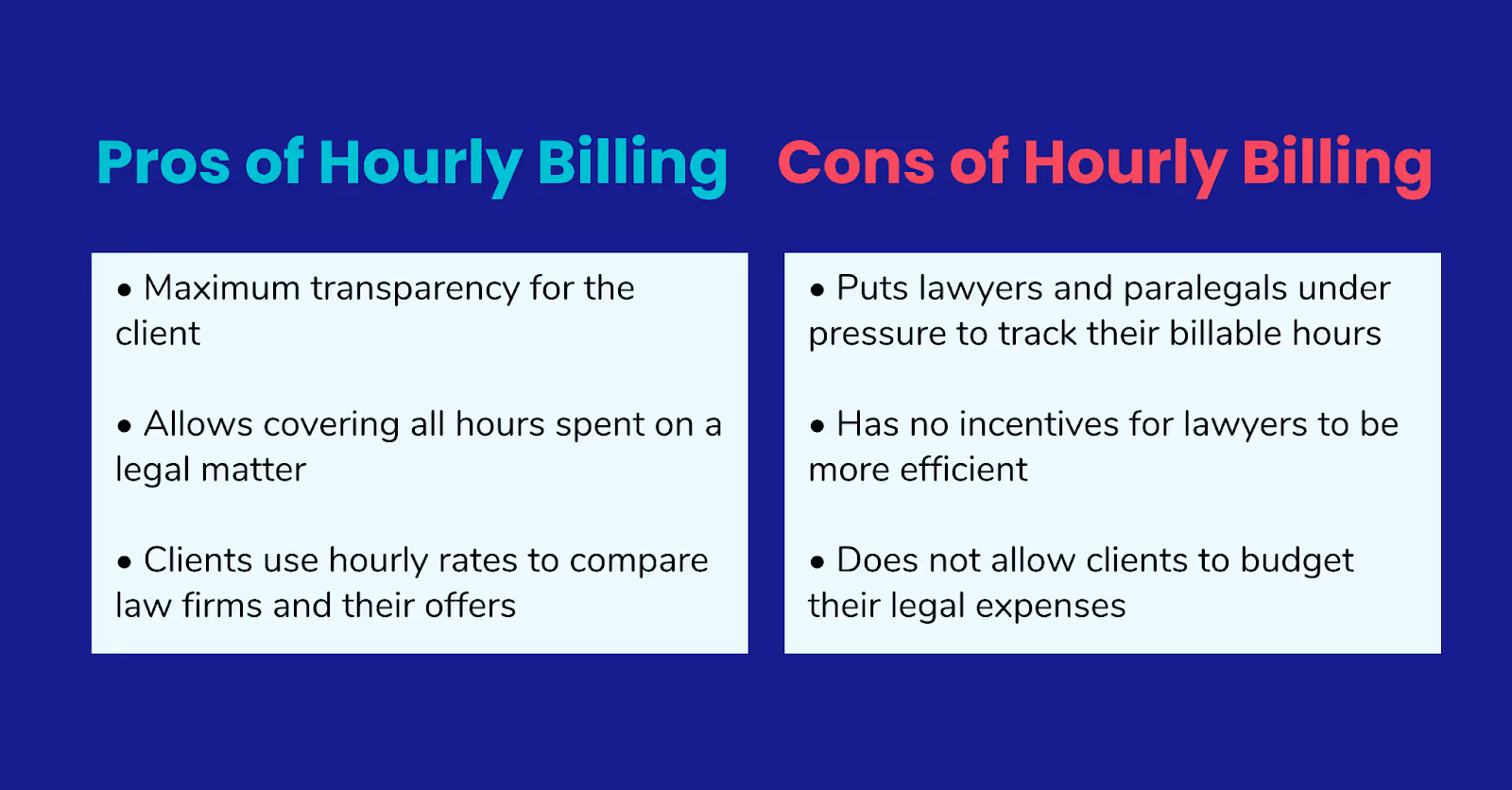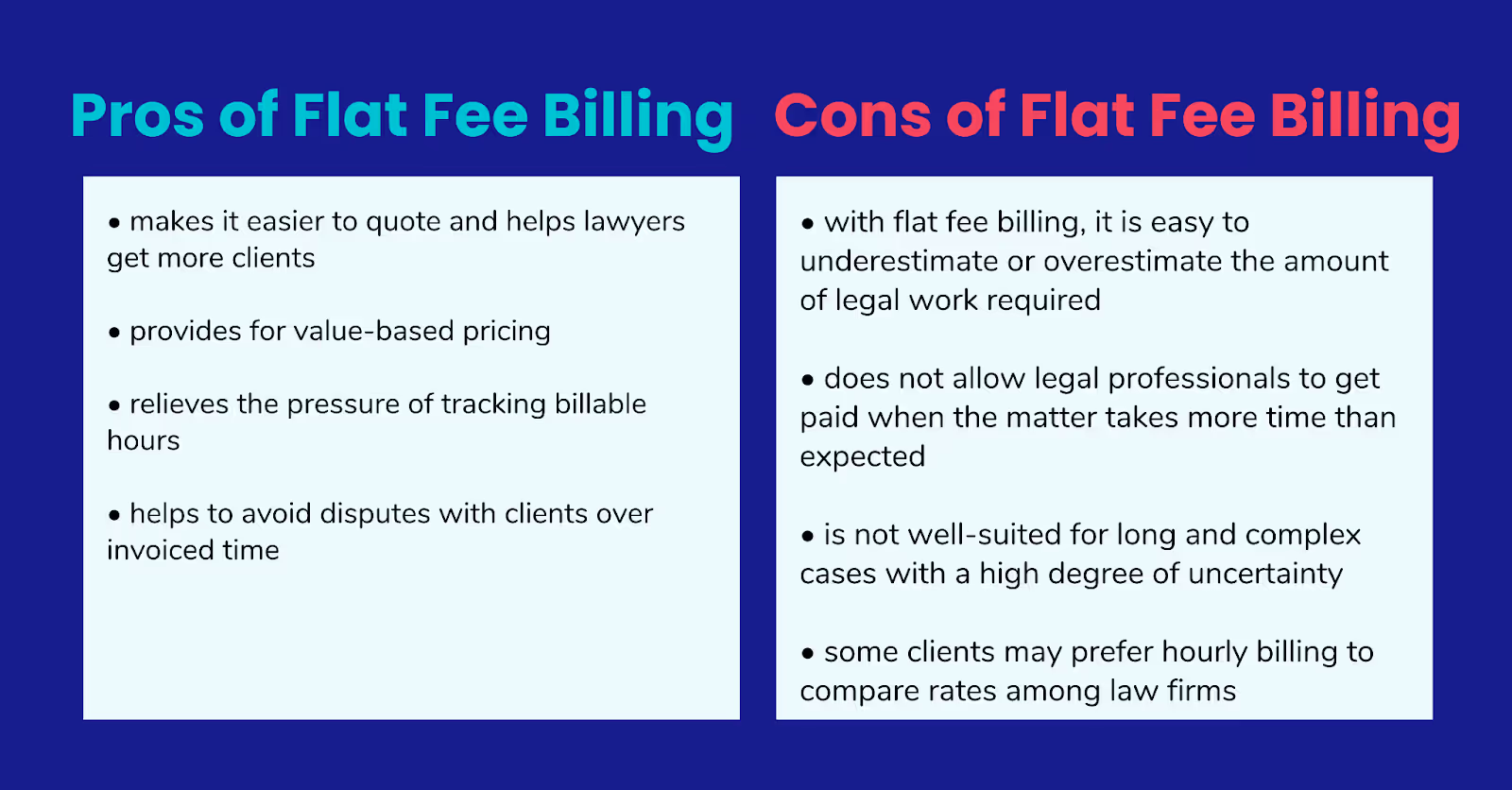Similar to many other professionals, lawyers have been traditionally using hourly billing. Yet this arrangement is not the only one used by lawyers and paralegals to charge their fees, cover the costs and market their legal services.
As lawyers struggle to have more billable hours and cope with administrative burdens, some legal professionals opt for fixed rate billing and other alternative billing methods. In many cases, such arrangements help lawyers provide their clients with better incentives and value-based pricing.
Meanwhile, law firms and in-house legal teams should be wary of the pros and cons of each alternative and leverage those billing methods, which work best for each client and legal matter. Here is more on the advantages and disadvantages of fixed rate and hourly billing and an overview of mixed billing methods that can help lawyers better market their services and generate more income.
Hourly Rate
Many lawyers are favoring hourly rate billing as it allows maximum transparency in calculating the legal fees and helps to invoice for all time allocated to a legal matter. It provides lawyers with the necessary flexibility in complex cases when the workload can increase or decrease depending on the development of a legal case.
Hourly billing for legal services is so commonplace that many clients even expect lawyers to offer hourly rates. By knowing an hourly rate, clients can compare law firms and their offers and choose those whose rates fall within clients' expectations.
Meanwhile, with hourly billing, clients get even more cautious when turning to lawyers as they cannot budget their legal spending. At the same time, lawyers and paralegals struggle to meet billable hours among the ever-increasing administrative workload. Finally, with hourly billing, lawyers can be less motivated to look for more efficient ways to handle legal matters while measuring the performance against the number of billable hours.
Here is a short summary of the pros and cons of hourly billing for law firms and in-house legal teams:

Flat Fee Billing
Flat fee billing is one of the most popular alternatives to hourly rates. Lawyers are increasingly using flat fee billing in less complex cases with standard routines and minimum uncertainly, for example, when setting up a corporation or handling transactions.
Many clients prefer a flat fee billing scheme as it provides certainty about their legal fees. For lawyers, flat fee billing makes it easier to quote on a project and get more clients.
In addition, with flat fee billing, the legal fees are no longer tied to the number of hours spent on a legal matter but, instead, are based on the value provided to clients. With flat fee billing, lawyers no longer have to struggle to accurately track billable hours. Besides, lawyers and paralegals who charge flat fees avoid disputes with clients over the legal fees and don't have to chase them for payments.
On the flip side, flat fee billing does not allow lawyers to get paid for additional efforts if the legal case takes more time than expected. For this reason, flat fee billing has limited uses for cases with a high degree of uncertainty, for example, in complex legal matters or where an opposing party is involved.
Below is a summary of the pros and cons of flat fee billing for law firms and in-house legal teams.

Alternatives to Fixed Rate and Hourly Rates
Some law firms combine fixed rate and hourly rate billing to maximize the advantages and minimize the drawbacks of both methods. The examples of such mixed billing practices include task-based flat fee billing and blended fee billing.
Lawyers who use task-based flat fees quote separate legal fees for each stage or type of the project. Legal professionals who apply task-based fees provide clients with a schedule of fees for each of the tasks and bill those which were fulfilled.
Other lawyers combine fixed rate and hourly rate billing by charging flat fees for standards tasks and applying hourly rates for anything which comes extra. This arrangement helps lawyers combine the benefits of both billing methods, control the workload and charge additional fees for any extra legal work.
In Conclusion
As technology is changing the legal industry, helping lawyers have more billable hours and saving the administrative burden, many lawyers have started to use alternative billing methods to provide better incentives to their clients. In doing so, lawyers must be cautious of the pitfalls of each billing method and use them sparingly, applying those which work best for each legal matter.
Legal professionals extensively use flat fee billing for routine legal tasks such as transactions, opening legal entities and other standard legal work. Meanwhile, trial lawyers and those working with complex legal matters rely on hourly billing or blended bulling utilizing both fixed and hourly rates.
Those law firms and in-house legal teams interested in improving the predictability of workload and having more accurate tracking of their billable hours are encouraged to look for digital tools for lawyers like Athennian. Legal technology helps lawyers cut administrative burdens and introduce more billing methods to provide better incentives to their clients and generate more income through legal work.



.avif)
%20(12).png)
.svg)



.avif)
.avif)



-p-500.webp)
-p-500.webp)
-p-500.webp)
.webp)
